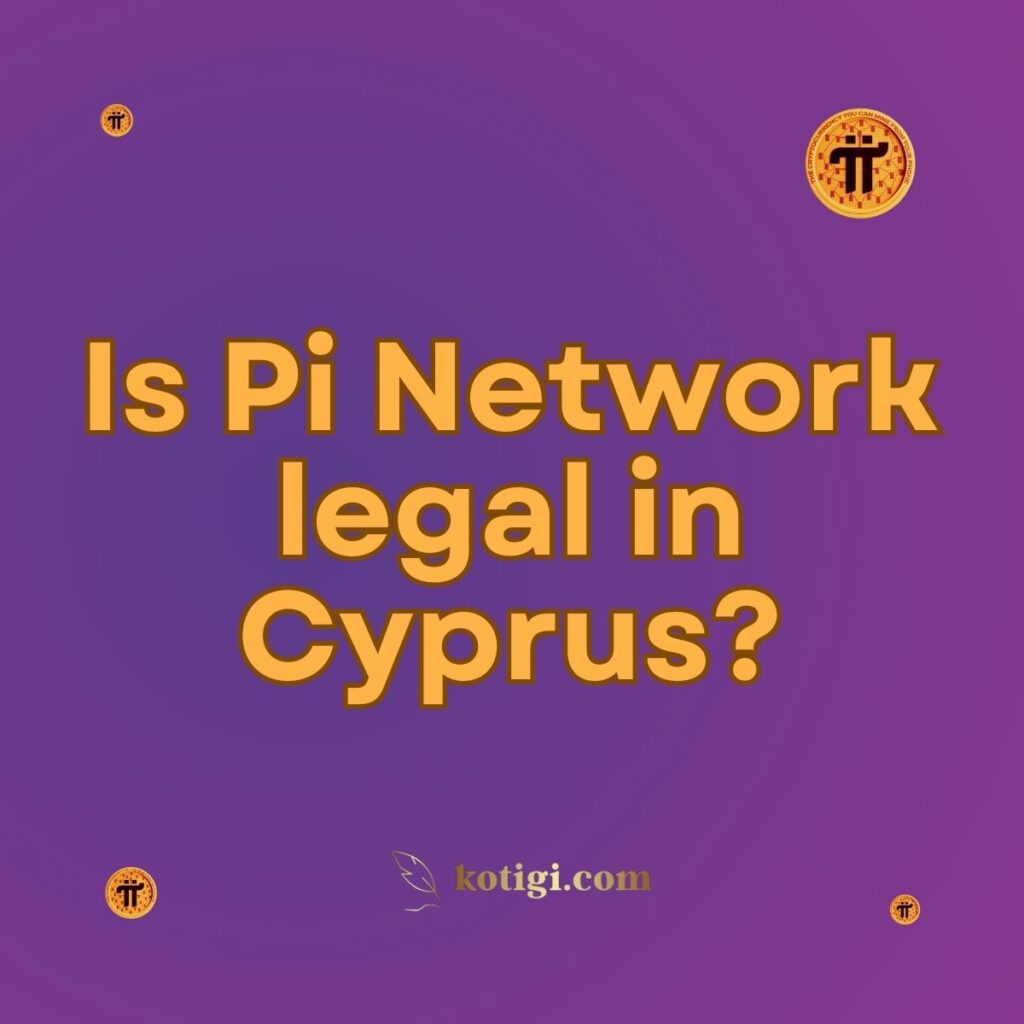
Is Pi Network legal in Cyprus?
Pi Network is legal in Cyprus, as the country has not established specific regulations banning the use of cryptocurrencies, including Pi Network. While Cyprus has taken steps to regulate the broader cryptocurrency market, Pi Network’s operations remain compliant under the current legal framework. Users are advised to stay informed about any future regulatory changes that may affect their participation.
Introduction
As the popularity of cryptocurrencies continues to rise, Pi Network has garnered attention from individuals worldwide, including Cyprus. Users in the country are keen to understand whether they can legally participate in Pi Network’s mobile mining operations without facing regulatory challenges. This article will explore the current legal landscape for Pi Network in Cyprus, taking into account the country’s cryptocurrency regulations, tax implications, and future outlook for the platform’s users.
1. Overview of Cryptocurrency Regulations in Cyprus
1.1 Cyprus’ Progressive Stance on Cryptocurrencies
Cyprus is considered a cryptocurrency-friendly nation, taking a progressive approach to digital assets while ensuring compliance with international financial standards. The Central Bank of Cyprus (CBC) has not imposed strict regulations on cryptocurrency usage, allowing individuals to engage in activities such as mining and trading. However, Cyprus has implemented certain measures to comply with Anti-Money Laundering (AML) and Know Your Customer (KYC) regulations, which may affect some aspects of cryptocurrency use.
1.2 Absence of Specific Laws on Pi Network
Currently, Cyprus does not have specific laws governing the use of Pi Network or similar mobile mining platforms. This absence of formal regulations allows Cypriot users to participate in Pi Network without legal restrictions. As Pi tokens are not yet traded on public exchanges, they do not fall under existing financial regulations concerning securities or commodities.
1.3 Regulatory Oversight on Cryptocurrencies
While there are no specific regulations targeting Pi Network, the CBC and the Cyprus Securities and Exchange Commission (CySEC) closely monitor cryptocurrency-related activities. Their goal is to prevent money laundering and financial crime while promoting transparency. Although Pi Network operates outside the traditional cryptocurrency market, Cypriot authorities may introduce more comprehensive regulations as the platform evolves and its tokens gain value.
2. Pi Network’s Legal Status in Cyprus
2.1 Current Legal Environment for Pi Network Users
At present, there are no legal barriers preventing users in Cyprus from joining and participating in Pi Network. Since Pi tokens do not yet have a market value and are primarily mined through a mobile app, they are not treated as financial assets by Cypriot regulators. This allows users to freely mine Pi tokens and contribute to the network without facing legal consequences.
2.2 Potential Regulatory Changes
As cryptocurrencies become more integrated into the global financial system, Cyprus may eventually establish a more defined regulatory framework for all digital assets, including Pi Network. While Pi tokens are currently not subject to taxation or financial regulations, future developments in Pi Network’s ecosystem could prompt the Cypriot government to introduce new policies. Users should stay informed about potential changes that may affect their involvement with the platform.
2.3 Impact of European Union Regulations
Cyprus, as a member of the European Union (EU), must comply with EU-wide cryptocurrency regulations. The EU’s Fifth Anti-Money Laundering Directive (5AMLD) requires member states to implement AML and KYC measures for cryptocurrency exchanges and wallet providers. Although Pi Network does not operate as an exchange or wallet provider, future EU directives may affect its operations if the platform begins to offer tradeable Pi tokens. Cypriot users should be aware of these broader regulatory trends and their potential implications.
3. Tax Implications for Pi Network Users in Cyprus
3.1 No Immediate Tax Obligations
At the moment, there are no specific tax laws in Cyprus that apply to Pi Network mining activities. Since Pi tokens are not yet tradeable and do not have a market value, they are not considered taxable assets. However, users should keep records of their mining activities, as future tax policies could require reporting of cryptocurrency earnings once Pi tokens gain value.
3.2 Future Tax Considerations
If Pi Network succeeds in launching a decentralized exchange and Pi tokens become tradeable assets, Cypriot users may be subject to capital gains tax or other income taxes on their earnings. The tax rate could vary depending on whether the tokens are classified as capital gains or ordinary income. Users are advised to consult with a tax professional or monitor updates from the Cypriot tax authorities to ensure compliance with any future tax obligations.
3.3 VAT Considerations for Merchants
As Pi Network develops and Pi tokens potentially become accepted as a form of payment, Cypriot merchants may need to account for Value Added Tax (VAT) on transactions involving Pi tokens. The exact tax treatment will depend on future guidance from Cypriot authorities and the European Union. Merchants interested in accepting Pi tokens should prepare for possible regulatory updates regarding VAT.
4. Risks and Challenges for Pi Network Users in Cyprus
4.1 Regulatory Uncertainty
One of the main challenges for Pi Network users in Cyprus is the uncertainty surrounding future regulations. While the platform is currently operating in a legal grey area, new laws or EU directives could introduce restrictions or additional compliance requirements for users. Staying informed about legal developments will be crucial for navigating this uncertainty.
4.2 Compliance with AML and KYC Requirements
As Cyprus implements EU regulations focused on AML and KYC, users of Pi Network may eventually need to comply with stricter identity verification and reporting requirements. This could affect the ease of use and privacy that Pi Network users currently enjoy. If Pi Network transitions into a fully regulated cryptocurrency, users may need to provide additional information to continue mining or trading Pi tokens.
4.3 Security and Privacy Concerns
Given that Pi Network is not yet fully decentralized, there may be concerns about data privacy and the security of user information. Users should ensure that they follow best practices for securing their accounts and personal data while using the app. As the platform grows and integrates new features, it is important for users to stay updated on Pi Network’s security measures and privacy policies.
5. Opportunities for Pi Network in Cyprus
5.1 Early Adoption Benefits
Cypriot users have the opportunity to be early adopters of Pi Network, mining tokens before they become tradeable on exchanges. This gives users a head start in accumulating Pi tokens, potentially positioning them for future benefits if the platform succeeds in achieving mass adoption.
5.2 Integration with Local Businesses
As Pi Network matures and Pi tokens gain value, there may be opportunities for local businesses in Cyprus to accept Pi tokens as a form of payment. This could help drive cryptocurrency adoption in the country and create new economic opportunities for merchants and service providers. Pi Network’s community-driven model could also inspire local entrepreneurs to develop blockchain-based solutions.
5.3 Participation in a Global Ecosystem
Pi Network’s global community of users presents opportunities for Cypriots to engage with a decentralized ecosystem and contribute to blockchain innovation. By participating in Pi Network, users in Cyprus can gain valuable experience with cryptocurrency technology and explore new ways to leverage blockchain for financial inclusion and digital transformation.
6. The Future of Pi Network in Cyprus
6.1 Potential for Legal Recognition
As Pi Network grows and its tokens gain value, there is potential for legal recognition by the Cypriot government. If Pi tokens become tradeable assets, they could be incorporated into Cyprus’ broader cryptocurrency regulations, offering users greater legal clarity. This recognition could also encourage further adoption of Pi tokens by local businesses and consumers.
6.2 Development of a Blockchain Ecosystem
Cyprus has shown interest in fostering a blockchain-friendly environment, with initiatives aimed at promoting digital innovation. Pi Network could play a role in this ecosystem by providing a decentralized platform for users and developers to create blockchain-based applications. The growth of Pi Network in Cyprus could contribute to the country’s reputation as a hub for cryptocurrency and blockchain development.
6.3 Potential for Cross-Border Transactions
With its position as a global financial center, Cyprus could benefit from Pi Network’s cross-border transaction capabilities. If Pi tokens become a viable means of conducting international transactions, businesses and individuals in Cyprus may find it easier to engage in global trade using Pi tokens. This could enhance the country’s role in the global cryptocurrency market.
Conclusion
Pi Network is currently legal in Cyprus, and users can freely participate in the platform without facing regulatory hurdles. However, as cryptocurrencies continue to gain attention from regulators, future developments may introduce new legal requirements for Pi Network users. Staying informed about regulatory changes and understanding the potential tax implications will be crucial for Cypriot users as Pi Network evolves. The platform presents exciting opportunities for early adopters in Cyprus, but users should remain cautious and prepared for the legal challenges that may arise in the future.
Key Takeaways
- Pi Network is legal in Cyprus, and users can participate without facing regulatory challenges.
- Cyprus has a progressive stance on cryptocurrencies, with no specific regulations targeting Pi Network at this time.
- Future tax obligations may arise as Pi tokens gain value, and users should keep records of their mining activities.
- Pi Network offers opportunities for local businesses to accept Pi tokens as a form of payment, contributing to the growth of Cyprus’ blockchain ecosystem.
- Cypriot users should stay informed about regulatory developments both locally and within the European Union to ensure continued compliance.





